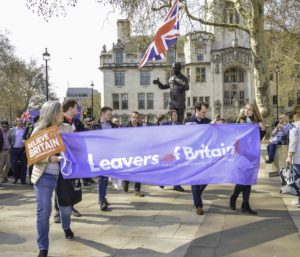Now we have left the Transition Period we asked Brexiteers if they feel Brexit is now complete, for their hopes and their predictions for the future.
Part 7 below. You can also read Part 1, Part 2, Part 3, Part 4, Part 5 and Part 6.

“As comedian Geoff Norcott quips when asked if he regrets voting for a conservative government. “No. I regret not getting one.”
Tam Laird, Leader of the Scottish Libertarian Party.
Did Brexit get done? I think only technically, but it was a long drawn out torturous process that could have been avoided by (a). Accepting No Deal from the get go. (b). Taking the Norway option. But it is at least a beginning.
How do you hope the U.K. will use the new found freedoms Freedom is a long way off. BoJo and co are doing their very best to comply entirely with the globalist agenda and their record on individual Liberty so far is abysmal. As comedian Geoff Norcott quips when asked if he regrets voting for a conservative government. “No. I regret not getting one.” But one hopes against hope that they will begin to tear up over sixty other international trade agreements that government had no real right to being involved with in the first place. Business should do business with business and make their own agreements.
What constitutional reform would you like to see happen next? I hope to see the repeal of the Equality Act of 2010 and the absolute right to free speech guaranteed in a bill of rights based on individual liberties. In the realms of fantasy I would like to see more regional autonomy within the UK on a confederation model.
What do you think is next for the EU? I think they may do their utmost to frustrate and hamper Britain at every available opportunity especially by using Scotland Ireland and Wales with their pro EU regimes as bulwarks. But I hope it dies a slow painful wasting death.
“electoral reform and the reshaping of the devolution settlement, including an English parliament based outside London and the reform of the House of Commons”
Andrew Bence, of the Social Democratic Party (SDP).
Did Brexit get done? Yes, although I can’t pretend to have an in-depth understanding of the pros and cons of the deal that was achieved. Meanwhile, as a non-economist and someone with zero experience of the import/export business, I wait with a degree of trepidation to see exactly how ‘things’ turn out. But the democratic will of the people has, finally, been respected, and as one of those who voted for Brexit, I shall own the decision we made.
How do you hope the UK will use the new found freedoms? Again, on economic matters I am a layman, trusting in those whose expertise I find persuasive, according to whom any short-term disadvantages will be superseded by advantages long term, as new cooperative arrangements bed in, we develop home-grown products, and export more widely. However, the EU isn’t the only jurisdiction running on a democratic deficit, and my dearest hope is that this renewed focus on sovereignty will inspire a rise in democratic engagement here in the UK, leading to electoral reform and an end to our present mediocre governing duopoly.
What constitutional reform would you like to see happen next? Abolition of the House of Lords is long overdue. I’d like to see that followed by electoral reform and the reshaping of the devolution settlement, including an English parliament based outside London and the reform of the House of Commons. Details can be found here: https://sdp.org.uk/policies/constitution/.
What do you think is next for the EU? Entropy? Just as with the broader liberal establishment, I don’t see those at the helm recognising the error of their ways any time soon. Therefore sensible reform, increased democratic accountability, the discarding of the federalist project, these things are unlikely to happen. Europeans will become increasingly disillusioned, looking to the UK to see if the alternative is proving preferable.
“I’d like to see the House of Lords abolished or cut in size. Also and I don’t know if this is constitutional related, but I’d like to see the lockdown over.”
Anonymous local Brexit campaigner.
Did Brexit get done? Brexit did get done. Technically that was done on 31st January 2020.
How do you hope the UK will use the new found freedoms? I’d like to see the UK cut unnecessary regulations and do more free trade deals, particularly with regards to services. Also, I’d like the UK to not pay welfare to EU nationals.
What constitutional reform would you like to see happen next? I’d like to see the House of Lords abolished or cut in size. Also and I don’t know if this is constitutional related, but I’d like to see the lockdown over.
What do you think is next for the EU? The EU will survive for now but the EU wants more integration and some member states want less. Eventually that will come to a clash and the EU will either back down or carry on. If it carries on other states will leave. If it backs down on integration then it might survive.

“we should unilaterally withdraw all import tariffs. Tariffs in the end are self-harming. …so we can reduce consumer prices and give everyone, the poorest in particular, a well-earned break”
Chris Mendes, Croydon South Vote Leave lead, and leader of The Foundation Party.
Did Brexit Get Done? Yes and no. We have ended the jurisdiction of the European Court of Justice and the EU Parliament and the EU Commission no longer govern our country. The free movement of people has ended and we are free to adopt free trade agreements with other nations.
This is excellent news. We who have campaigned hard for our right to national self-government can rightly feel a sense of liberation and victory.
But is this the treaty I would have agreed to? No it is not.
Boris Johnson’s government simply identified and prioritised a set of checkboxes they felt needed ticking to survive in government – namely, the separation from EU institutions mentioned above to placate “Leave” voters, and continued tariff-free access to the Single Market to placate “Remain” voters.
Everything else important was wrongly deprioritised. It is why Northern Ireland remains attached to the Single Market, why the EU still has shared access to our fishing waters, and why in this treaty we have agreed to common rules on employment, competition, state aid and the environment.
These would not have been agreed to if the Prime Minister had a full understanding and a loyal devotion to the principles underlying our independence in the first place. The whole point of leaving is for us to have our own internal conversations about all matters under the sun and to decide for ourselves what we want to do – it’s called democratic self-government.
But yet again, the Conservative Party have agreed to a treaty which is simply supposed to be about trade, but actually includes other policy agreements which it shouldn’t.
The good news however is that we can cancel this new treaty and walk-away in the future, or renegotiate the terms, if we so wish.
Theresa May’s appalling “Withdrawal Agreement” meant that both parties, the UK and the EU, had to agree to its termination before it could be terminated. We effectively came very close to national imprisonment, such was the naivety and insensitivity of that period in our political history.
In summary, having left the European Union a year ago and now agreeing to this new treaty, we are finally an independent and sovereign country again.
But the fight for enhancing our freedom and our liberty further still, with respect to this treaty, as well as Westminster itself and policy matters across the board, is still well and truly on the agenda.
How do you hope the UK will use the new found freedoms? First and foremost, now that the dilution of our democracy has been reversed, I expect us to discuss as a nation and decide at our general elections what our trade, fisheries, agriculture and immigration policies ought to be.
We haven’t had an open discussion on these matters in recent decades due to Westminster outsourcing them to the European Union, but now our elected politicians are responsible for these matters again, the people will rightly expect robust debate on these vital issues for them to make an informed decision.
On the subject of trade, we should unilaterally withdraw all import tariffs. Tariffs in the end are self-harming. The EU’s Customs Union only succeeds in forcing millions of EU citizens to buy and sell goods at highly inflated prices. We should abandon import tariffs so we can reduce consumer prices and give everyone, the poorest in particular, a well-earned break and more money left over to save or spend on their own priorities.
Moreover, and this is where Boris Johnson’s treaty will hold us back, my ambition would be to look very closely at our industries and identify heavy-handed and counterproductive EU regulations, and indeed UK regulations, that are unnecessarily disrupting economic growth.
Government does need to regulate the markets and there are plenty of areas where constraint is justified, the environment being a sound example. But over recent decades our free market system has become less and less free and we are worse off as a result.
For example, the EU’s gigantic and overly-complex GDPR data protection regulation ought to be abolished, in favour of something far lighter and less burdensome on small businesses. Our archaic Sunday trading laws should also be abolished and we should allow businesses to trade on any day at any time.
Let’s free business to do what they do best and focus on giving the consumer the freedom to choose. This will allow us to grow the economy, expand our manufacturing base and create more jobs across the board in the long-term.
What constitutional reform would you like to see happen next? After 47 years of our membership of the European Union, with the democratic injustices throughout, such as the signing of treaties that damaged the nation’s capacity for self-government without the consent of the people, the refusal to grant the people their say for so long, and the attempts by Parliament to subvert our decision to leave at the first chance we got, the obvious question is – how do we prevent this from happening again?
The answer is to introduce a Sovereignty Protection Act that prevents Parliament from severely diluting our national sovereignty without the consent of the people.
No policy may be implemented or law passed that would render our Parliament subordinate to any other. Politicians elected in other countries must never again be empowered to make our laws. We should forever have our own independent trade, immigration and defence policy. Our territorial waters shall remain ours to regulate, police and enforce. We shall forever remain economically independent with our own currency and our Supreme Court shall remain supreme.
Never again shall politicians have the unilateral right to change any of the above without explicit permission from the British people, expressed in a referendum, first.
Moreover, we also need a Referendum By Petition Act to allow referendums on constitutional matters to be triggered by popular petition.
If the people are unhappy with a given policy, we simply wait until the next election and vote for a change. But if we are unhappy with how the Government and Parliament works, and what powers over us they have, suiting the politicians but not the people, we must have a route to change.
When a petition on a constitutional matter obtains at least 10% of the voting population, a referendum for the people to adjudicate the matter must be held whether the politicians like it or not.
What do you think is next for the EU? The direction of travel for the European Union is clear – more centralisation, command and control by the EU’s undemocratic institutions.
Frontex, the “European Border and Coast Guard Agency”, has this week become the EU’s first uniformed service.
This anti-democratic centralisation of power is the irreversible direction of travel of the European Union. This particular reform allows the EU to step closer towards a centralised immigration and border policy, which it has always wanted, and which was accelerated as a result of the EU migrant crisis in 2015.
In that same year, Angela Merkel, the German Chancellor of course, and then-French President François Hollande, both appeared and spoke at the EU Parliament.
They openly stated in explicit terms, and indeed this was one of the very reasons why I decided to campaign for our exit from the European Union, that the EU must have a common defence and common foreign policy.
This dangerous and anti-democratic ideology of centralisation towards a single state called Europe, without the people of Europe’s consent, is at the heart of the true purpose of the European Union.
Now that Britain has left, the authoritarian and paternalistic ideological zealots of Europe’s political elite, who hate the notion of the democratic nation state, will now have a much clearer pathway to their fanatical utopia.
Undemocratic and authoritarian empires that hide from accountability and democratic consent do not last forever. They all come to an end. And so in time will the European Union.









